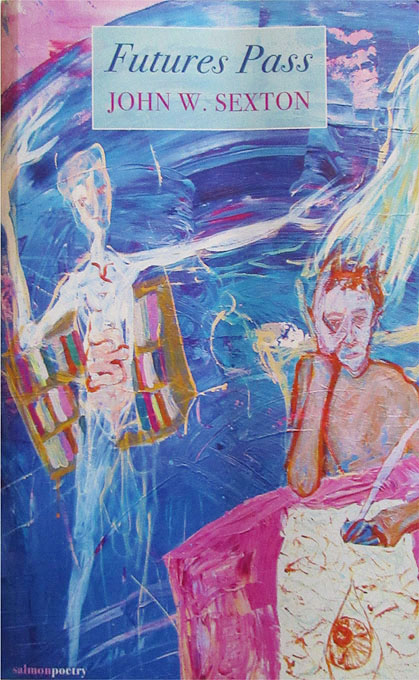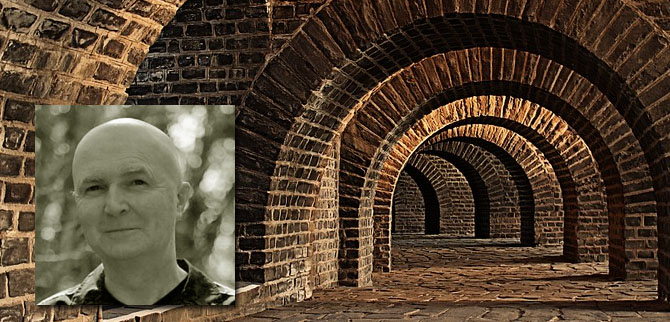Portrait of a Poet of the Ancient Mind, Guest Editorial by John W. Sexton
John W. Sexton was born in 1958 and lives in the Republic of Ireland. He is the author of six poetry collections, the most recent of which is Futures Pass (Salmon Poetry 2018). A chapbook of his surrealist poetry, Inverted Night, is forthcoming from SurVision Books early in 2019. In 2007 he was awarded a Patrick and Katherine Kavanagh Fellowship in Poetry. Most recently, his poem “The Snails” was shortlisted for the Irish 2018 An Post / Listowel Writers’ Week Poem of the Year Award.
 Our minds are born long before our bodies, although, when we are bodily born, our minds are swamped with sensation and are without language. Our bodies, now newly made, are well able to thrash about and perform some of their necessary functions, but the mind is dumb, except for the ability to bawl or coo. With that limited lexicon of grunting and crying and gurgling we flounder about until our tongues get the grasp of language; but once language comes it comes from both outside us and inside us. What comes from the inside comes from the mind that was forming at the beginning, inside our mothers, where the dead ancestors, dormant in our blood, then gave full belt to their chatter, keeping us company in our forming.
Our minds are born long before our bodies, although, when we are bodily born, our minds are swamped with sensation and are without language. Our bodies, now newly made, are well able to thrash about and perform some of their necessary functions, but the mind is dumb, except for the ability to bawl or coo. With that limited lexicon of grunting and crying and gurgling we flounder about until our tongues get the grasp of language; but once language comes it comes from both outside us and inside us. What comes from the inside comes from the mind that was forming at the beginning, inside our mothers, where the dead ancestors, dormant in our blood, then gave full belt to their chatter, keeping us company in our forming.
When I was born, nearly 61 years ago now, the place I came to was not my own. It wasn’t the place of my ancestors or even the place of my parents, for they had travelled over from Ireland – my mother directly by boat, my father indirectly via Iraq, Singapore, Malaya and all the places that a brief sojourn in the British Marines had taken him to first. Anyway, there I was, born and brought up in London. But London was beyond the gate of the house. Inside the house was Ireland, the hilly pastures of north Kerry and Limerick, most of it furnished from the tongue of my mother. Iraq, Singapore, Malaya, London, even the radio and the black and white television, couldn’t disrupt the Ireland of the house. Almost every year, during the full extent of the summer holidays, my mother would bring us back to the Ireland she had furnished the house with, while my father stayed in London working, joining us only for the final week. So when I stepped out into London, I stepped out as an Irish kid. And the mind, full of the chatter of the long dead, was Irish too.
Not all of the dead were as dead as the dead. One of the dead, a young baby, kept me company through a lot of my early years. She was a floating spirit, without a spoken language, and never aged beyond her babyhood. In that sense, even though she was dead, she managed to be immortal, accompanying me wherever I went. No one knew of her except me. I told no one of her existence until I was in my late thirties. I was in my fifties before I learned of her name. She was my sister, but a secret one, one that could not be talked of. Of course, I assumed, taking her existence for granted because she was with me everywhere, that I was a half-twin and that she had died in childbirth, and that’s why I never mentioned her to my mother, for fear of upsetting her. How could I tell her that all was well and that my sister’s ghost was with us always? I was over five decades alive before I learned that she was the child of a different father, someone in my mother’s life before my father came along. Dad took mum and my sister into his life and the intention was to claim my sister as his daughter. I was born but a few weeks when she died. But she didn’t leave me. She stayed with me for years, my invisible sister, gurgling and cooing and bawling in her ghostly way, and I minded her and soothed her and accompanied her and kept her from the darkness.
This is, I suppose, the mad talk of a poet. I had a poet’s mind and a spirit guide from the very beginning, so it’s little wonder that a poet I remain. My guide wasn’t a Beatrice, like Dante had, but a baby sister. One, ironically, that was born before I was, but who never aged a moment. How could I fear the dead or death with such a guide by my side, such a guide to show me, from my earliest years, that death is not an ending or a disaster, but a companionship, a sister?
When I came back to live in Ireland in my early twenties I began to become aware that poetry was hidden in the background of both my parents’ birthplaces. My mother was from Ahane Mountain in Brosna, Sliabh Luachra, and the old English name for Brosna Village was Rhymers’ Town. Where my father was from in West Limerick, the Inchabaun townland of Templeglantine, there was a folk memory of a Poets’ Court once held thereabouts. In fact, it was not far from Inchabaun that the poet Michael Hartnett lived in the 1970’s. Whenever I visited these places I could hear the chatter of the long dead.
There’s a tradition that the last true poet of the Bardic School, Dáibhí O Bruadair (1623-1698), is buried out at Monagae, where all of my father’s family are also buried. The two great poets of Kerry that followed him into Irish language poetry, Aodhagán Ó Rathaille (d. 1729) and Eoghan Rua Ó Súilleabháin (d.1782), were associated with Sliabh Luachra, the mountainy land where my mother was from. These poets, all of the long dead, began to seem kindred to me, and I read as much of their poetry as I could. But not having the grasp of Irish I had to read it through cribs and distortions. In the finish I began to tackle making my own versions of it, and became infected with their concept of vision poetry. It was as if theirs were the voices that had been with me since the womb; that theirs was a company akin to that of my ghostly, invisible sister.
Aodhagán Ó Rathaille’s great vision poem, Gile na Gile, describes an encounter with the sky woman, the Brightness of Brightness. Through all the voices of the dead, it is She, I now believe, who calls us to poetry. It is She who sends the dead to guide us. She is a manifestation of the creative energy that informs the universe. Ah, but here we go again, with that mad talk of a poet. But why not? Here are the first two verses of Gile na Gile (in my own version, first published some years ago):
Glimmer of glimmer I saw on the path neglected;
green glass of green glass the blue of her eyes inflected.
Her language the notes of birdsong, of voices inhuman;
her skin of fire, of snow; now white, now crimson.
Twisted and twisted the braids of her hair a sunset;
the earth and the hills all one with their ferns pure russet.
The brooch at her neck a star that had died in great brightness;
a fragment of light, since she was creation’s first instance.
The other day, thinking over what I might write about for this brief essay, I suddenly recalled a memory from my childhood. I was nine, and standing at the threshold of a whitewashed shed in the yard at Brosna. My uncles Jack and Aney were deep inside the shed. They were talking to the bull. I could see nothing of him distinctly, except the soft glisten of his enormous nostrils. Not even the brightness of his eyes could I see, for everything in the shed was a hazing shadow. The bull was shadow and he took up the entire interior of the shed. Jack and Aney were a part of this shadow. It was as if they were inside the bull itself. Their voices went back and forth, in and out through the bull, soothing him like the voices of the long dead. The bull spoke back, but the voice came from his nostrils – a brutish snorting. Then someone was squeezing past me at the threshold, a man in a long beige workcoat. He walked into the shadow. I stepped back, out into the sunlight of the yard. Sometime later, the man emerged with uncle Jack and uncle Aney. And the bull. But now the bull had a brass ring through his enormous nostrils, and dangling from it was a rope, and he was being led by my uncle Aney. Not a hint of shadow was in him now; nothing was about him but the full dazzle of the sun. He was still the bull. He was still a creature who could absorb the shadows. He was still massive and powerful. But the brass ring had made him its servant.
Poetry is the brass ring that makes me its servant. But I am no less strong despite it. It leads me everywhere and will lead me, one day, right into death itself. But the dead never die.
My sister’s name is Julia.
© John W Sexton


